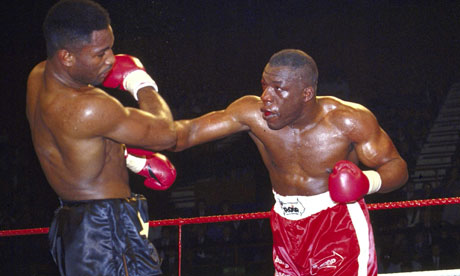 Gary Mason, right, taking on Lennox Lewis for the British heavyweight title at Wembley Arena in 1991. Photograph: Action Images
Gary Mason, right, taking on Lennox Lewis for the British heavyweight title at Wembley Arena in 1991. Photograph: Action Images Gary Mason, who has died in a cycling accident at the age of 48, will be remembered principally for the only professional boxing match he ever lost – for the British heavyweight title against Lennox Lewis at the Wembley Arena in March 1991. The 28-year-old Mason was a 2-3 favourite, but had a problem that Lewis exploited mercilessly: a year earlier he had had surgery to repair a detached retina on his right eye.
Lewis had trained by placing tape just above the right eyes of his sparring partners. He closed Mason's eye, forcing a stoppage in the seventh round, but only after absorbing some heavy body blows. Several years later, he acknowledged to me: "You may be surprised, but of all my opponents, Mason hit the hardest."
Mason, the London-born son of a Jamaican-born carpenter, grew up in Clapham, south London. By his late teens he had developed a powerful 6ft 1in physique, which he put to good use in the amateur boxing ring.
In 1984 he turned professional under the management of Mickey Duff, who developed his career carefully. By then Mason had grown to more than 17 stone, and was far too strong for his initial opponents. After a three-year apprenticeship, Duff arranged more challenging contests, and Mason proved that he was more than just a heavy-handed brawler. He had a tight defence, an accurate jab and – unlike Duff's premier breadwinner, Frank Bruno – one of the hardest chins in the business.
Mason beat Hughroy Currie in the Royal Albert Hall, London, to win the British title in January 1989, but by then his focus was on the world rankings. His biggest victory came later that year when he knocked out America's former Olympic super-heavyweight gold medallist, Tyrell Biggs, in seven rounds. This propelled Mason to fourth in the rankings of the World Boxing Council, but soon afterwards he suffered the detached retina and retired briefly.
Nine months on, following surgery, he returned to stop another American fringe contender, setting up the Lewis fight for a record British title purse of £276,000. Duff was delighted, accusing Lewis's management of "doing a Cecil B DeMille in reverse – taking a star and turning him into an unknown". Instead, the defeat, and the consequent loss of the British title, began a long downward spiral for Mason. "After losing to Lennox, I just didn't want to play any more," he told me. He changed his mind three years later, picking up a couple of wins in the US, but when he was refused a UK licence he retired for good at the age of 32 with a record of 37 wins, 34 of them knockouts, and one loss.
His party-loving lifestyle and doomed investments, including a jeweller's shop called Punch 'n Jewellery, had soaked up his savings, but he pressed on with fresh schemes. He made a pilot programme called Who's Gary Mason? and hawked it around the television studios, "but nobody seemed to want it". He signed for the London Crusaders rugby league side but gave up after three games. He invested in a clothing line called Punch and Style, "but that didn't work out either". He worked as a Sky Sports commentator, but inadvertent on-air swearing led to his being dropped.
Mason then headed for Tenerife, in the Canary Islands, where his activities included promoting arm-wrestling shows, "but no one would invest". He later set up stall as a boxing promoter, predicting: "In time I will be as devastating as a promoter as I was as a boxer." But again it flopped. Soon after his final tournament, his father died and his brief marriage collapsed. He took a job as a hospital security guard, but was fired for too much flirting with the female staff. One of his subsequent ventures was to front a charity called the Rhythmical Empowerment Group to "promote equality and diversity through music and rhythm".
Throughout all these setbacks, Mason came across as a bright, optimistic and avuncular man, always willing to help at charity events, full of ideas and schemes and always ready to break out into his deep "ho-ho-ho" laugh, invariably at his own expense.
Mason was riding his bicycle in Wallington, south London, when he was in a collision with a van, and was pronounced dead at the scene. He is survived by a son.
• Gary Mason, boxer, born 15 December 1962; died 6 January 2011



0 comments:
إرسال تعليق